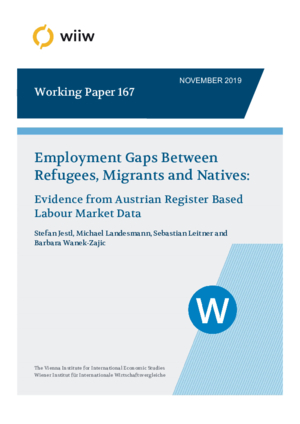Employment Gaps Between Refugees, Migrants and Natives: Evidence from Austrian Register Based Labour Market Data
Stefan Jestl, Michael Landesmann, Sebastian Leitner and Barbara Wanek-Zajic
wiiw Working Paper No. 167, November 2019
56 pages including 14 Tables and 9 Figures
This paper analyses labour market integration in Austria of non-European refugees originating from middle and low income countries for the period 2009-2018. We assess their probability of being employed in comparison to non-humanitarian migrants, European third country immigrants and natives. We draw on a register based panel dataset covering the complete labour market careers of all individuals residing in Austria. We control for macro level explanatory variables (e.g. the labour market situation at the time and the place of settlement) and individual characteristics. The analysis shows that initial refugee employment gaps are large in the first years when labour market access is difficult. After a period of seven years the unconditional gap between refugees and natives declines to 30 percentage points, similar to the one of non-humanitarian migrants, but the gap is still further decreasing. After controlling for a set of additional explanatory variables, the conditional gap amounts to only 10 percentage points at the same time. Moreover, our analysis provides insights into differences between employment gaps across population subgroups of immigrant groups and natives by gender, age and education level.
Disclaimer:
Research for this paper was financed by the Anniversary Fund of the Oesterreichische Nationalbank (Project No. 17166). Support provided by Oesterreichische Nationalbank for this research is gratefully acknowledged.
Keywords: Refugees, Migrants, labour market participation, longitudinal research
JEL classification: J61, J15, F22
Research Areas: Labour, Migration and Income Distribution
